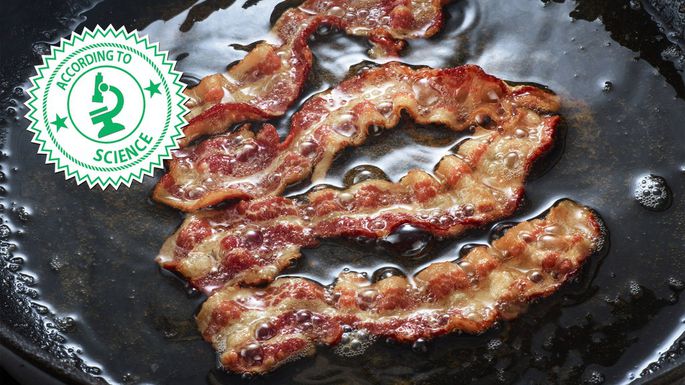You just finished making a double batch of bacon for Sunday brunch. Your kitchen’s a mess, but it’s a beautiful day outside, and you’re eager to get moving.
Sure, you could carefully transfer the leftover hot grease into a jar or empty aluminum can, let it cool, then eventually toss it into the trash like you’re supposed to. But your sink drain is right there. What’s the harm of dumping the grease down the drain just once?
Here’s why.
The big, greasy idea
You already know this, but it bears repeating anyway: Grease is liquid when it’s hot, but as it cools, it solidifies into a gelatinous glob.
“It’s easy to think that water from your sink just washes everything along, but fats are sticky, binding substances that are prone to causing buildups and eventually clogs.”
And it’s not just bacon grease you need to watch out for, but trimmings from steak and other rich cuts of meat, butter, vegetable oil, even cream.
Despite having blades, “garbage disposals lack internal scrubbing mechanisms, without which oils can leave their mark over time,” James says. “This can eventually cause blade decay.”
So what? If a slow drain and slightly duller disposal blades were the only notable side effects, we’d probably suck it up, buy a can of Drano and keep lazily tossing our greasy leftovers into the sink. (At least occasionally.)
But there’s a fat lot more to the issue.
The science of food scum
Once your leftover grease works its way into the sewer, problems ramp up.
“Since big municipal sewer pipes are made from concrete—which is alkaline and made of calcium—you can saponify the fat,” explains Bill Carroll, Jr., an adjunct professor of chemistry at Indiana University
A quick chem lesson: Saponification is the process of making soap.
“You make soap by reacting—not just mixing, and that’s important—fat with lye, which is sodium hydroxide,” Carroll explains. “The net result is … a fatty acid negative ion that is attached to a sodium positive ion.”
So what’s wrong with that? Soap is a cleaning agent, right?
Well, there’s soap and then there’s soap. Remember that sewage contains calcium—i.e., the stuff that makes “hard water.” The calcium replaces the sodium attached to the fatty acid in your soap. Suddenly, you don’t have an easily washed away version of soap, but a stubborn version much like soap scum or a bathtub ring.
And that makes for an uncooperative, sticky mess that’s hungry to trap all the other noxious stuff we humans put down our pipes. Think: wet wipes, condoms, needles, and human waste.
In other words, your seemingly innocent pan of bacon grease is helping to create a mountain of indissoluble fat scum underground called—as you may have heard—a “fatberg.”
The fatbergs aren’t coming—they’re already here
Fatbergs are not just spooky legends concocted to keep people from throwing their bacon grease down the drain. Fatbergs are real. And they are spectacularly repulsive.
Last fall, one was discovered in a London sewer that was the size of 11 double-decker buses. Trained personnel in protective gear had to be called in to remove it. When high-powered hoses didn’t work, they had to use micro-tools—i.e., “hand-to-hand weapons.”
To be clear, you’re not going to get a fatberg in your home pipes, which aren’t made of concrete (calcium). But remember: Your home is connected to a sewer system. In London, the fatberg wasn’t discovered until many nearby toilets began backing up. Pretty much a homeowner’s worst nightmare.
Plus, when you consider that one fatberg cost Baltimore’s Public Works Department an estimated $60,000 to clean up, that cost may very well trickle down to local homeowners.
The best way to degrease
To protect your plumbing—and do your part to prevent fatbergs from taking over the world—you really do need to pour leftover grease and oil into an old can or glass jar and throw it into the trash, James says.
(Foodies would strongly disagree, urging you to save this “liquid gold” and use it for sauteing veggies or scrambling eggs.)
Either way, let the grease cool first so you don’t burn yourself, then pour (or scoop if congealed) into a glass, ceramic or stainless steel container. Don’t use a plastic container, since the chemical makeup will react with the grease and make it a nightmare to clean thoroughly.
Or, you can always embrace the chemistry—and make bacon soap.
